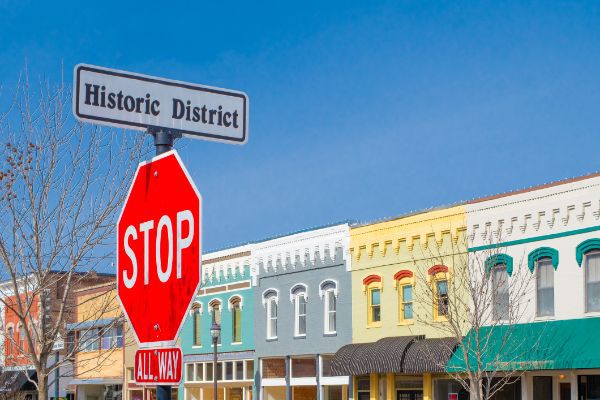When you think of a historic district, images of charming Victorians with ornate stain glass windows and wrap-around porches may come to mind. Imagine if you purchased a home that doesn’t remotely fit this description, only to later learn that your street is being considered for historic designation. Naturally, in this situation you would want to know: What happens when my neighborhood becomes a historic district?
What Makes a Property Historic?
In Florida, different cities will have criteria for what makes a property historic under their ordinances. However, in most cases, the property must be a certain age and be connected to its era of origin. For example, in West Palm Beach, a property that is at least 50, and has architectural merit or is associated with a famous event or person, and has design or content that is representative of its time period may qualify. Additionally, archaeological sites can also be nominated for historical designation.
There are also measures used by the National Register for Historic Places for federal designation. However, just being 50 or older does not necessarily make a home historic. Under the national standards, the property also has to have design features or architecture of the era. A home or building’s connection with a famous person or historical event is also important. Some properties may have multiple historical features that can make it part of a historic district. For instance, in Key West, Ernest Hemingway’s House is on the National Register in all likelihood because of its age and mid 1920’s design, as well as its connection with the famous writer.
Why Would a Neighborhood Become Historic?
When several historic properties are grouped in a neighborhood, designating that community as historic can be a means to protect and preserve community character and uniqueness. When a district is selected, certain property renovations have to be done in a manner that complies with the applicable ordinances and is compatible with the surrounding area. The historic district designation can serve to maintain the neighborhood’s historical appearance. Additionally, property owners in historic districts are usually eligible for considerable tax savings.
What about Homes in the District that are not Historic?
When a neighborhood is designated, some properties may be historic while others are “non-contributing,” meaning that the owner would have to make changes to restore the home’s historic quality or that the property does not qualify. However, in many cases all owners in the designated area benefit equally regardless of their individual property’s status.
What is the difference between Local and National Register Designation?
The National Register will research the structure’s history and features for purposes of the historic district designation, but does not review proposed changes to properties. Florida villages, towns, and cities have their own ordinances for historic designation. Because local bodies govern zoning and construction matters, this is the authority that will review proposed renovations and tear downs in a historic district. The governing body will also vote and make decisions on several other related matters.
Can a Neighborhood Refuse Historic Designation?
Local ordinances dictate how community members are notified of the potential for designation and the manner in which they can object. Community members are given the opportunity to attend a public hearing and voice their concerns. The town council can vote on various matters including whether a property meets the criteria for designation.
Recently, in The Town of Palm Beach, a dispute over the historical designation of one home led to its street and two others being considered for a landmark study. However, when the Landmarks Preservation Commission announced its decision to study Midtown’s “Sea streets” (Seaspray, Seabreeze, and Seaview avenues), the majority of community residents were vehemently opposed. These homeowners breathed a sigh of relief when the Palm Beach Town Council temporarily halted the study plans. Whether the study will proceed, remains to be seen.
Contact the Florida Board Certified Real Estate Attorneys of Rabideau Klein
At Rabideau Klein, we have extensive experience handling multi-million-dollar transactions for high-end residential and commercial real estate in the Palm Beach area. Guy Rabideau, Esq. and David E. Klein, Esq. are also Florida Board-Certified Real Estate attorneys with the expertise and experience you need to protect your interests during your Palm Beach County luxury real estate historical property matter. Contact Rabideau Klein today to discuss your Palm Beach real estate legal needs.

